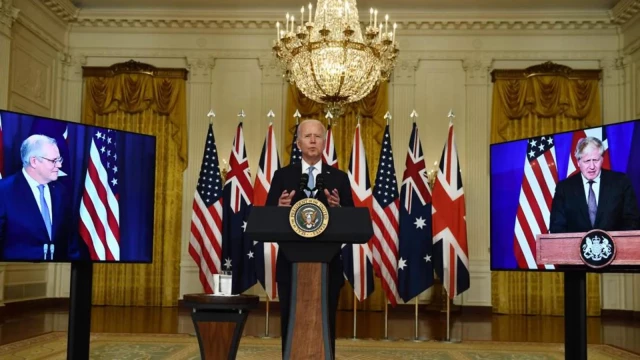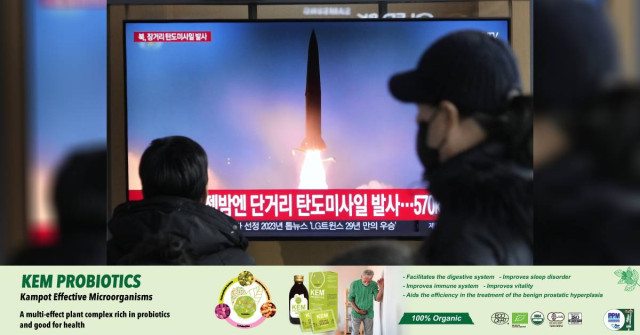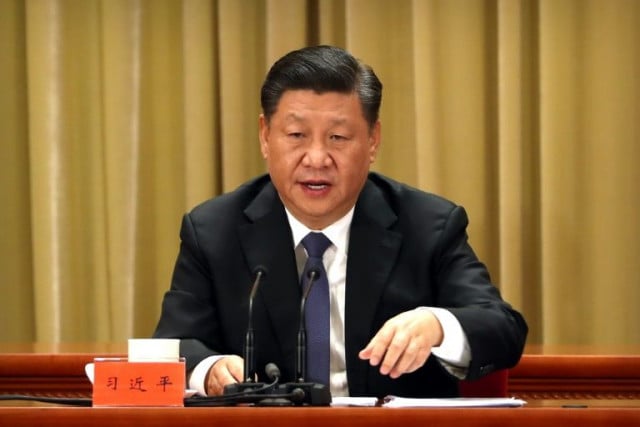Is AUKUS a Threat to ASEAN Centrality?

- By Vun Phanith
- and Lim Chhay
- March 11, 2022 4:57 PM
Bloc faces relevance amid divided loyalties
The world has entered a period of intensifying geopolitical rivalry between the United States and China. This is no longer an ideological confrontation but a strategic competition on complex issues in which the Indo-Pacific has become the main battlefield.
The arms race, the power projection, and the assertiveness of great powers' military into the region are hot topics concerning regional security architecture.
As a regional grouping of ten member states, ASEAN is expected to play a central role in shaping regional and international security for peace, prosperity and harmonization.
The organization has undergone internal and external challenges, including how to maintain resilience of ASEAN centrality in the region. With such complexities and uncertainties, ASEAN seems to have struggled to deal with the AUKUS security pact made by Australia, the United Kingdom and the US.
The AUKUS agreement was signed on December 15, 2021, to deepen security cooperation by technically supporting Australia’s capacity to set up nuclear-powered submarines.
This aims to encounter China's rising assertiveness in the region. The AUKUS members saw the pact as cooperation to strengthen and sustain peace and stability in the Indo-Pacific region.
Such promotion of security engagement among the trilateral partners of ASEAN poses concerns about how ASEAN centrality can be compromised and maintained, primarily through coping with its close partners, including China.
Threats to ASEAN centrality
Geopolitically, ASEAN is like a platform for the great powers' strategic competition, while members of the bloc have different attitudes to these key partners.
While the US and China maintain maritime security, their confrontation, particularly expansion of power over the South China Sea, ASEAN's position and its role in mitigating conflicts remain loose and fragile.
The ASEAN Outlook on the Indo-Pacific approach was launched in 2019. It saw ASEAN centrality as the underlying principle for promoting cooperation in the region.
However, nothing was achieved to bring up the rival parties to consider ASEAN as a leader for their common interest and security.
The AUKUS alliance is possibly another trigger to lessen the role of ASEAN in shaping regional security architecture. Some member states of ASEAN, including Indonesia and Malaysia, have seen this security pact as promoting Australia to have future nuclear weapons with help from their allies. This would contradics the 1995 Southeast Asian Nuclear Weapons Free Zone (SEANWFZ) Treaty.
Strategically, ASEAN shares concerns over the launching of the AUKUS agreement, except for Singapore and Vietnam, where they are likely to accept it. It is believed that the pact could spark tensions among the great powers, particularly China's rising aggression in the South China Sea.
Likewise, the Philippines has a prolonged dispute with China over the Spratly Islands. It supports the pact and hopes such cooperation with AUKUS limits Chinese assertiveness in the sea.
Indonesia raised a similar fear that ASEAN will lose its centrality in the region if AUKUS members maintain their position to increase Australia's nuclear capacity through assistance from the US and the UK. This action could trigger a nuclear arms race, possibly leading to a nuclear war in the South China Sea.
ASEAN geographical position brings the bloc into the center of the strategic competition of the great powers. ASEAN is questioned over its ability, centrality, and relevance in shaping its regional security architecture. Therefore, ASEAN needs to reposition itself in this complex regional security scenario. This comes when Cambodia has taken over the ASEAN Chairmanship in 2022.
What ASEAN should do
ASEAN has to do its homework and bring more substance to its concept of centrality. The association claims to be involved in all decisions relevant to the region. The concept stays relevant under the Biden administration, as US foreign policy will not change drastically in the region.
After the so-called Quad, a security dialogue between the US, Australia, India, and Japan, AUKUS is the relevant forum where ASEAN is not sitting at the table.
This process is causing uncertainty in ASEAN about its role in creating security in the region.
AUKUS should be seen as an attempt to address the perceived imbalance in the regional balance of power stemming from China's military build-up and assertiveness. It reflects ASEAN's lack of ability to cope with China's increasing assertiveness in the maritime domain, particularly in the South China Sea.
With ASEAN Outlook on the Indo-Pacific, ASEAN leaders intended to reinforce the ASEAN-led regional architecture and the commitment to maximize the opportunities from regional and global cooperation through ASEAN-centered mechanisms.
Yet currently, the concept of inclusive and cooperative security seems inadequate. AUKUS has become known as China's rise containment maritime security policy, and that happens with the absence of ASEAN in the first place. The regional bloc must start becoming concerned about its "centrality. "
AUKUS as well as the Quad, illustrate ASEAN's apparent inability to respond effectively to changes in the geopolitical environment. This represents an evolving new Asian security architecture where bilateralism runs parallel to multilateral institutions centered on ASEAN.
Two researchers William Choong and Ian Storey at the ISEAS–Yusof Ishak Institute argue in a joint piece, "Given that AUKUS and the Quad are essentially responses to China's military modernization and belligerence, ASEAN would need to manage two challenges simultaneously: harnessing the power of such extra-regional initiatives to maintain a balance of power while simultaneously ensuring ASEAN cohesion and relevance in the fraught regional security environment."
Even if AUKUS's signatories seem far from ASEAN, it demonstrates ASEAN's weaknesses and loss of relevance when there are more security partnerships without ASEAN at the core.
Security-wise, ASEAN is believed to have been weakened by internal and external challenges in recent years. Internally the lack of political cohesiveness among its member states has caused problems, while externally intense major-power rivalry harms ASEAN.
AUKUS also shows ASEAN disunity. It is no surprise that ASEAN has no united position towards AUKUS. The reactions depend very much on the affiliation of each member state with China or the US. That is one of the reasons why it is increasingly difficult for ASEAN to maintain its centrality and neutrality between the superpowers.
The member states act in their national interests and not in the common interest of ASEAN. Therefore, ASEAN is at a crossroad where it must promote unity to address challenges.
If ASEAN is not speaking with one voice and the member states' reactions remain independent, the centrality of the association will decline. AUKUS, the Quad and China's aggressive behavior in the South China Sea show that the acceptance of ASEAN centrality by the US and China is declining.
Reactions to AUKUS from Southeast Asian states have been largely positive. Many states see AUKUS as an opportunity to balance the balance of power in the region.
For example, Singapore's Prime Minister Lee Hsien Loong has said that he hoped AUKUS would contribute to peace and stability in the region in a constructive way and complement regional structures.
Nevertheless, there are also concerned voices. While countries like Vietnam, the Philippines, and Singapore welcomed the announcement, Indonesia and Malaysia expressed concerns.
Cambodia voiced concerns with a few careful words that it wishes that AUKUS does not fuel any unnecessary or unhealthy major power rivalries in the region.
In this way, the Kingdom seems to show that it will not take any side, yet such a security pact remains a challenge as it has been struggling enough over the US-China strategic competition. These different stances show that the interest of ASEAN's member states does not always align with ASEAN's interests.
In this environment, Cambodia, which has a reputation for leaning towards China, has taken over ASEAN's Chairmanship. The expectations will primarily be on the priorities and challenges for the Chairmanship.
The third Cambodian Chairmanship is more special than ever as the outcome of the Covid-19 pandemic is still unclear, ASEAN's comprehensive recovery framework is yet to be implemented, the political crisis of Myanmar is still unresolved, and the strategic competition between the great powers seems only to intensify.
Officially announcing the "ASEAN Act–Addressing Challenges Together" as the Chairmanship theme, the Kingdom is committed to bringing all ASEAN member states to tackle regional and international issues. It will be a hard fight for Cambodia's ASEAN chairmanship to keep the association united and maintain its centrality and relevance.
The current geopolitical risks have again challenged ASEAN's resilience and relevance in shaping an ASEAN-led regional order.
Therefore, ASEAN countries must continue to work hand-in-hand for pragmatic regional cooperation to formulate a collective stance rather than showing disunity. There is a simple lesson that ASEAN needs to learn after the current developments: If you are left out because you are too weak, get stronger.
Wanted or not, ASEAN unity and centrality must be discussed, and the big challenge for Cambodia is how it can manage a collective voice on ASEAN's response to regional security pacts.
ASEAN collective views must be "ASEAN-led" rather than different views based on national interests. It is time to act boldly.
The minimum that needs to be achieved is that ASEAN speaks with one voice on the international stage. And that is already difficult enough considering the dynamics inside ASEAN.
A bold approach for the ASEAN chair must come up with a big vision of united policies: A common security policy and a common law of the sea. It's time for small countries to act big to foster a "togetherness" that further consolidates ASEAN centrality to achieve the people's goal of the people of ASEAN.
Edited by Daniel Schmücking, Country Representative of Konrad-Adenauer-Stiftung Cambodia
Co-Writers:
VUN Phanith, JDS fellow and Research Student at Ritsumeikan University, Japan. Contact: [email protected]
LIM Chhay, Program Officer at Konrad-Adenauer-Stiftung Cambodia and research Fellow for EU-ASEAN Think-Tank Dialogue. Contact: [email protected]















